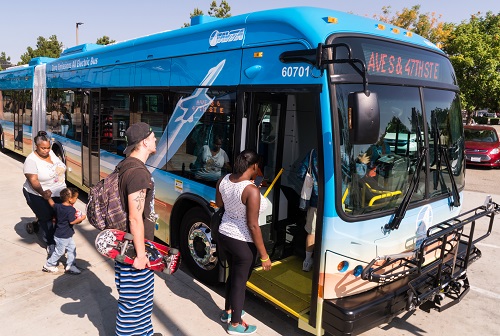Low or No Emission Grant Program - 5339(c)

What's New
- On November 20, 2025, FTA announced approximately $2 billion in Low or No Emission and Grants for Buses and Bus Facilities project selections, supporting 165 projects in 45 states and the District of Columbia.
- Read the press release
- View the Selections and Implementation Guidance for FY25 Bus and FY25–26 Low-No
Overview
The Low or No Emission competitive program provides funding to state and local governmental authorities for the purchase or lease of zero-emission and low-emission transit buses as well as acquisition, construction, and leasing of required supporting facilities.
Allocation of Funding
Funding is allocated to projects on a competitive basis, from proposals submitted to FTA in response to a Notice of Funding Opportunity (NOFO). Past project selections include:
Eligible Applicants
Eligible applicants include direct or designated recipients of FTA grants; States; local governmental authorities; and Indian Tribes. Except for projects proposed by Indian Tribes, proposals for funding eligible projects in rural (non-urbanized) areas must be submitted as part of a consolidated state proposal. States and other eligible applicants also may submit consolidated proposals for projects in urbanized areas.
Eligible Activities
Eligible projects include:
- purchasing or leasing low- or no-emission buses
- acquiring low- or no-emission buses with a leased power source
- constructing or leasing facilities and related equipment (including intelligent technology and software) for low- or no-emission buses
- constructing new public transportation facilities to accommodate low- or no-emission buses
- rehabilitating or improving existing public transportation facilities to accommodate low- or no-emission buses
- Additionally 0.5% of a request may be for workforce development training and an additional 0.5% may be for training at the National Transit Institute (NTI). Applicants proposing any project related to zero-emission vehicles must also spend 5% of their award on workforce development and training as outlined in their Zero-Emission Transition Plan, unless the applicant certifies that their financial need is less.
Statutory Reference
49 U.S.C. 5339 (c), IIJA § 30018, IIJA Division J
Funding Availability
Funds remain available for obligation for four fiscal years. This includes the fiscal year in which the amount is made available or appropriated plus three additional years.
Match
All eligible expenses under the Low-No Program are attributable to compliance with the Clean Air Act and/or the Americans with Disabilities Act. Therefore, the Federal share of the cost of leasing or purchasing a transit bus is not to exceed 85 percent of the total transit bus cost. The federal share in the cost of leasing or acquiring low- or no-emission bus-related equipment and facilities is 90 percent of the net project cost. Applicants must identify these specific activities in their application in order to receive this increased federal share.
Resources
- Additional information on Zero-Emission Fleet Transition Plans
- Low and No-Emission Vehicle Federal Technical Assistance
- Coordinating Council on Access and Mobility (CCAM)
- FTA’s Bus Testing Program
